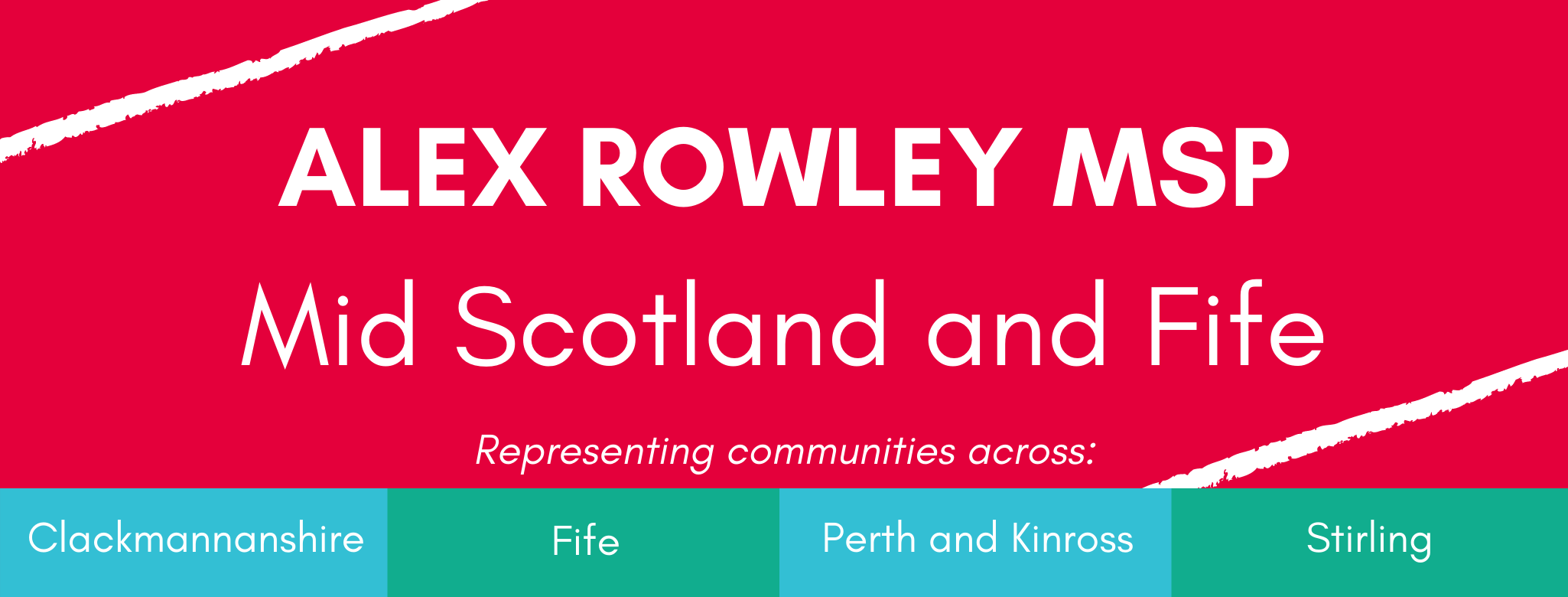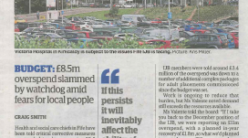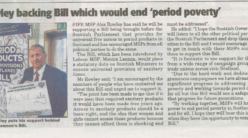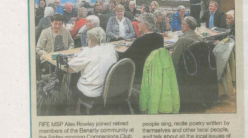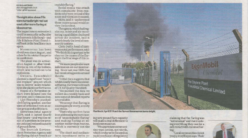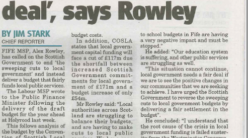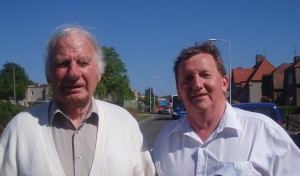
to be able to deliver a tribute to this remarkable man.
Willie Clarke – A Tribute
Lord Lieutenant, Provost, distinguish guests, ladies and gentlemen, and comrades, I would like to begin this evening by thanking all of you for coming along to the new Benarty Centre here in Ballingry to celebrate and give recognition to a remarkable man who has given 40 years of his life to public service as an elected councillor in Fife.
It was on Tuesday the 8th of May 1973 that Willie Clarke was first elected as the Communist Candidate to the Fife County Council as the member for the Ballingry ward and then the following year 1974, he was elected onto the new Fife Regional Council to serve Benarty. That is the villages of Ballingry, Crosshill, Lochore and Glencraig. And the rest as they say, is history.
And it is that history where I want to begin tonight in paying this tribute to Willie.
Born on the 25th of June 1935 in the mining village of Glencraig Willies mother Christina would be the major influence on him in his young days and indeed throughout his life. But sitting alongside that influence would be his surroundings and his community and it would be that community that would shape the thinking, the politics and the direction that Willie Clarke would take in his life that leads us here tonight to celebrate a man that has helped thousands of people over his life time and has helped shape these local communities and indeed communities across the whole of Fife.
For Willie was born into a period in time where there was across Britain a great class divide and his class was the working class and his community, a mining community. A mining community where the pit raws were basic, outside toilets, no bathroom, no bath or shower and indeed no pit head baths for miners to wash as they came up out of the earth after their hard shifts at the coal face.
So you might say it was no wonder that these communities were full of political and trade union activism, activism which demanded and fought for better working conditions, for basic health and safety and for a basic standards of living. In the same year that Willie was born, 1935, Mr Willie Gallagher was elected as Member of Parliament for West Fife which took in the Benarty area.
The significance of this was that Willie Gallager was a communist candidate and there was much celebration that he was elected to Parliament. So as Willie Clarke grew up in Glencraig, Gallagher the MP and what he stood for would prove to be a major influence on Willies developing
political philosophy.
There was also a strong Communist Party influence in many of the Scottish Coal fields and this was particularly true in the Cowdenbeath area, in Lumphinance through to Benarty with the village of Glencraig sitting at the heart of this highly politicised area and regularly returning communist councillors at that time.
Indeed, as a youngster, when Willie had completed his 7 years at Glencraig Primary school and moved up to Lochgelly East school in 1947 other pupils would refer to him and fellow villagers as the communists such was the reputation of the village of Glencraig. And it should be stated that at the ge of 12 the label of communist is one that Willie wore with pride just as he is happy to wear the same label with pride today.
Willie also speaks about the influence of the post war Labour government which in his opinion was the most forward looking and progressive of the last century. The nationalisation of the pits, the creation of the welfare state and taking into public ownership the steelworks, the railways, gas and electricity. A mass house building programme and the creation of the National Health Service, the greatest insurance policy of any country in this world. So – proud of his communist credentials, but also proud to stand alongside any party or individual that would work for the cause of improving the conditions and life experiences of workers and their families. And also with a political hero in Labours Nye Bevin this was the young Willie Clarke and his upbringing in Glencraig.
At the age of 15 when leaving school Willie got his first ob at Glencraig Pit where he worked on the surface for the first year till he was legally able to go down the pit at the age of 16. The next number of years would be spent working – with his free time being dedicated to political education and political activism working alongside others, making the case for better and safer conditions for miners and their families. Working alongside Willie in Glencraig was another young activist by the name of Lawrence Daly who had been brought up in the same street as Willie, South Glencraig Street and who would go on to become the General Secretary of National Union of Mineworkers in the 1970s and early 1980s.
As Willie describes the political landscape at the time he says that the Communist Party was the industrial wing of the Trade Union Movement whilst the Labour Party acted as its political wing. And Willie would follow the industrial path serving first on the youth committee of the NUM and then being elected as pit delegate at Glencraig in 1960 a position he would hold till the pit closed in 1966.
On moving to Kirkcaldy it was just a matter of months before Willie was elected into the position of Branch Secretary for Seafield Colliery. Willie also continued to be involved in the wider mining communities organising events and supporting people. In his own community he was the treasurer of Glencraig Miners Club from 1969 to 1995 when it closed.
Interestingly it had remained open all those years despite there being no pit and no village left. But for Willie it was about more than raw politics, it was about community, the galas, the children’s parties and the people working together, looking out for each other and being there for each other in times of difficulty.
It was only therefore natural that Willie would want to do a wider job in the community and for him it was with great pride when he was elected to Fife County Council on Tuesday the 8th of May 1973 as a communist councillor for Ballingry. Sworn in the next day at the Headquarters of the Council in Cupar, Willie and his supporters were over the moon but that euphoria would soon turn to deep sadness as Willie got the news on the Thursday evening that he had to make his way to Seafield and when there as he made his way down the pit to discover that five men had lost their lives in an accident, the youngestonly 20 years old.
It was not the first time nor would it be the last that Willie saw death in the pits but he would make the point that the majority of miners that died as a result of the industry died in their own homes as a result of disease breathing in the dust of the pits and Willie has spent all those years since working and fighting for the compensation for the families of the miners who died prematurely as a result of disease from working in the pits.
So Willie now had the dual role of Councillor and Trade Union Official which would allow him to continue to fight against injustice and bad practice in both industry and in the community.
But, ironically fate would change things again when in September 1976 the General Secretary of the NUM Lawrence Daly was involved a horrific car crash traveling to Scotland from the Labour Party conference in Blackpool. Also travelling in that car and killed in the crash was Scottish NUM Executive member and fellow Glencraig man Johnny Stewart.
After the grieving had passed Willie took the decision to stand for election to the twelve man Scottish Executive of the NUM and was elected, a position he held until he retired from the pits in 1987.
Indeed such was his influence that he was known across the Scottish coal fields as a speaker, campaigner and leader for miners and whilst the option of a national role remained open for Willie it was his choice to remain local and remain as a councillor working here in Fife for local
people.
That did not however stop him from continuing to play a significant role at a Scottish level in the NUM and he led delegations as far afield as Belgium and spoke at meetings all over the UK making the case and building moral and financial support for the miners in their historic struggle in the 1984/85 miners’ strike. Within the NUM Executive Willie did question the tactics but he led from the front during those difficult and bleak years.
Willie was also a member of the STUC energy committee and represented the STUC as a member of Fife Health Board in 1980s where the fight
was very much focussed on stopping the privatisation of health services in Fife.
Willie also had another big reason why he preferred to remain working in Fife, his family and the lady who has been by his side and been the strength behind the man for so many years, his wife Betty.
The leader of the Scottish miners Mick McGahey was asked by a journalist during the miners’ strike of 84/85 how important was the role of the miners wives and partners in the strike and he responded by saying; “Did you ever see a bird flying with one wing”. McGahey knew that the role of women in the strike was absolutely crucial as it had been proven to be the case in all past major disputes and today in recognising Willie; we also have to recognise the role of Betty in supporting Willie in all that he has been involved in over these years. But for both of them family is at the heart of what they do. Willie and Betty have 7 sons, 5 daughter in laws, 9 grandchildren and 3 great grandchildren and have said often that their love for family is what drives them day in and day out.
I also mentioned at the start of this tribute Willies mum Christina and the major influence she would have on his life. She made sure from an early age that he was well read and impressed upon him the importance of reading and widening his knowledge. Her love for all things Scottish made sure that evening in those days he visited Edinburgh and many of the cities of Scotland taking in art, drama and history to widen his education and his mother continued to be a major influence until her death in 2008 at the age of 97.
Being a councillor also allowed Willie to push for investment locally and across Fife in what was his passion. Nelson Mandela famously said; “Education is the most powerful weapon which you can use to change the world” and it was this most powerful weapon that Willie took such an interest in as a councillor. He sat on the education committee and locally he campaigned for more investment in education and for a new high school for children in his area. In 1995 he saw that come true with the completion of the new Lochgelly High School to be followed by a revamped Benarty Primary school into the old Junior High and the former Crosshill school becoming an education and training centre run by the Benarty Regeneration Group which Willie had set up to help people in the area get the skills they needed to get jobs. Then to top it all he then saw the former primary school converted into a community centre for the area.
But as we know the 1980s and early 90s in Britain was a period of political, social and economic unrest with mass unemployment and all the social ills that came with that leaving many communities devastated. No more so was this the case than here in Benarty and it was Willie who rose to that challenge working with the community to develop the credit union, now one of the most successful in the country, the education and training facilities, a local office and local development teams.
As Nye Bevin put it; “Discontent arises from a knowledge of the possible, as contrasted with the actual”. And the role Willie played was to continue to make clear what was possible with an uncompromising message that never should communities and people lie down and working with others he ensured that Fife Regional Council remained focussed on tackling the social ills of that time setting up regeneration and investment areas driving an anti-poverty agenda across Fife.
I think it is fair at this point to acknowledge that many of the socialist ideals around nationalisation and public ownership on which Willie built his political philosophy, when put into practice by the 1945 Labour government did not produce the result that he would have expected or wanted over the longer term. Willie has himself has made the point often that in the short and medium term these actions did address the worst of the social inequalities within our country – and today no one could seriously claim that capitalism is working in the interest of the majority of people either in this country or indeed across the world.
It was Tony Benn who said; “It is wholly wrong to blame Marx for what was done in his name, as to blame Jesus for what was done in his”
Benn also argues; “Although socialism is widely held by the establishment to be outdated, the things that are most popular in British society today are little pockets of socialism, where areas of life have been excluded from the crude operation of market forces and are protected for
the benefit of the community”
As a socialist and a Marxists Willie continues to make the argument that there is a better way, a more fairer way and more just way and this is the argument he has progressed throughout his career in public life.
Willie has always said to me and I am sure to many, that ‘politics is not a sprint, it is a marathon and if you are serious about making change based on the principles of fairness and social justice then you must be in for the long haul’. And I am sure you will all agreed that Willie has certainly practiced what he has preached.
He has also, always taken a much wider interest in issues. I can also tell you that Willie has been in every prison in Scotland and indeed some south of the border! In his role in Chairman of the Glenochile Prison visiting committee and as vice chair of the Scottish Prison Committee he took the role seriously and worked to ensure that prisoners were treated in a decent and humane way again, not judging people but applying his principles to the situation as he found it.
In 2007 a new system of proportional representation for electing councillors was brought in for Scottish local government and Willie was elected to the new ward of the Lochs which as well as Benarty is made up of Kingseat and Kelty and last year he was re-elected for another five years.
In those years Willie has been instrumental in driving Fife Councils decentralisation agenda bringing the council and decision making closer to communities and has chaired the Cowdenbeath Area Committee with the same focus and determination that has been so evident throughout his life.
And, I would say to you that it is that ability to work with others, to always show humility and give advice and offer a wise council when required that has resulted in so many achievements. It was the late John F Kennedy who said; “Let us not negotiate out of fear. But let us never fear to negotiate.” And the great ability that Willie has brought to bear for the advantage of the communities he has served is the ability to negotiate.
Willie negotiated with a previous Labour administration to get a replacement for the old community centre in Ballingry and then a few years ago when he discovered there was not enough money in the plan he took me along with him to a meeting with council officials and negotiated the budget up from £2 million to £3.8 million and as we left the room he turned and said to me, that went well don’t you think!
Tonight we stand in that new Community Centre and I would suggest that this building is in itself a tribute to the hard work, dedication, ability and humility of Willie Clarke.
But something that is even stronger than his negotiation skills is the sheer strength of his character.
That character would be tested to the full when back in 2011 when Willie was diagnosed with having skin cancer and after a small operation did not succeed he went through major surgery. When Willie woke up after the surgery in St Johns hospital in Livingston with Betty and the family at his side his first concern was could he speak. So his main concern was continuing his work and he needed to be able to speak to do that.
As the days passed and he got stronger his family were suggesting to him that he would now have to think about taking it easier, but his response was to ask for a note pad and a pen, he had observed a few things whilst in hospital and wanted to write to the health Secretary with some
suggestions.
And that has been the character of Willie, in for chemo one daye and out the next day at meetings, radio therapy in the morning and working in the community in the afternoon. Many many would have laid down having gone through such an operation and programme of treatment, but Willie, well it has been business as usual.
For any authors in the audience tonight, I have no doubt there is a good book waiting to be written, but for now, will you join me in congratulating an amazing man for an amazing life of service to others. Willie Clarke.
Alex Rowley
Fife Council Leader
24 May 2013
